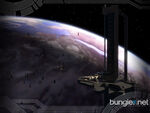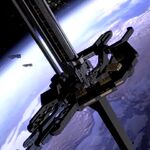m (clean up, replaced: Avery Johnson → Avery Johnson) Tags: apiedit rollback |
LZ32 (Message Wall | contribs) m (swithing a picture from gallery with main pic.) Tag: rte-source |
||
| Line 2: | Line 2: | ||
{{Ship |
{{Ship |
||
|name=Orbital Defense Platform |
|name=Orbital Defense Platform |
||
| − | |image=[[File: |
+ | |image=[[File:H2A Mission CairoStation.jpg|330px]] |
|manufacturer= |
|manufacturer= |
||
|class=Weapon Platform |
|class=Weapon Platform |
||
| Line 103: | Line 103: | ||
H2-Cairo_Station_1600.jpg|ODPs over Earth |
H2-Cairo_Station_1600.jpg|ODPs over Earth |
||
CairoStation-Callouts.jpg|A schematic of Cairo Station |
CairoStation-Callouts.jpg|A schematic of Cairo Station |
||
| + | |||
| − | + | Macstationcairolarge1ki.jpg|Cairo Station in ''[[Halo 2]]'' |
|
</gallery> |
</gallery> |
||
Revision as of 02:47, 1 September 2015
- “That MAC gun can put a round clean through a Covenant Capital Ship.”— Avery Johnson[1]
An Orbital Defense Platform is a class of large UNSC space stations, used to defend strategic locations of great importance, typically planets of high strategic value.
The stations are frequently placed in geosynchronous orbit and deployed in groups, or clusters, of two to five platforms. The well-equipped and large bridge of an ODP is suitable for directing large-scale engagements. Such was the case when Fleet Admiral Terrence Hood directed UNSC forces from an ODP during the Battle of Earth.[1]
Facilities
Internally, the stations are remarkably spacious and comfortable, complete with high ceilings, atriums, observatories, and a monorail system to move personnel and equipment. In addition to numerous small craft bays, there are two docking stations for UNSC Warships, large enough to station frigates, such as the UNSC In Amber Clad. The design incorporates many features to guard against potential hostile boarding action, such as a large garrison of marines and armories situated throughout the station.
Each station appears to have "habitats." These areas appear to be purely cosmetic and for the enjoyment of the staff and personnel on the platforms, featuring vaulted ceilings, numerous plants (likely plants found in the region, planetside, which each station orbits over) observatories, and seating areas.
Internal security stations are likely not utilized for actual combat with hostile forces. More than likely, the stations are used more to keep the staff and personnel aboard safe during non-combat situations and ensure the smooth operation of the station.[2]
Armament
The Mk. V "Super" Magnetic Accelerator Cannon is the station's primary armament. By activating several sets of super conductive coils in a series which envelope the barrel, the Mk. V can launch a 3,000 ton tungsten/depleted uranium projectile at 11991698.32 meters per second. As noted by Sergeant Major Avery Johnson, the Mk. V can punch a hole clean through a shielded Covenant Capital Ship. Orbital Defense Platforms fire at 4% of the speed of light, around 12,000 kilometers per second (11991698.32 m/s).
These cannons fire a 3000-ton ferric-tungsten round at 119991698.32 metres per second. At 3000 metric tons (3'000'000 Kilograms), and using the formula KE = 0.5 * m * v2, then the energy of each shot should equal, 0.5 * 3'000'000 * 11'991'698.322, which equals 2.15701E20 joules of force. Given that a Kiloton = 4'184'000'000'000 joules, then 2.15701E20 / 4'184'000'000'000 is equal to 51'553'834.34 kilotons, which is 51553.83 megatons, or 51.56 gigatons of TNT.
Only the Didact's personal ship has been shown to survive the impact of these rounds. Against Covenant shield technology, the rounds possess enough kinetic energy to punch through shields, cut through the ship, and, upon exit, still retain enough energy to destroy a second ship, and cripple a third ship.
It is theorized that if a ship's armor or shields were to absorb all the kinetic energy of a super MAC round, the release of thermodynamic energy would still vaporize the ship. By receiving power from ground-based power plants, orbital platforms could achieve a recharge and reload rate as short as five seconds.
No sources indicate the presence of additional weapons, such as point defense cannons commonly mounted on UNSC warships (the absence of such weapons may explain why so many Covenant Boarding Craft were able to latch onto the Platforms orbiting Reach and Earth). A possible explanation is that UNSC warships may be assigned to preventing the boarding and loss of the essential platforms-the fact that boarding craft were able to secure several stations during the battles of Reach and Earth can be explained by the fact that the Covenant naval force was overwhelming and any assets were already engaged or out of action.
Power plant
Orbital Defense Platforms do not posses their power supply on board-as such generators would consume far too much space and provide for quicker neutralization by hostile naval forces. Instead, ground-based generators transmit power to the stations. This allows for bigger, more efficient generators for the platforms. Each cluster is in geosynchronous orbit with its generator complex-contrary to the popular belief that the stations are in orbit with the cities or regions which they are named after.
However, the ground-based generators are also a great weakness, while heavily shielded and protected are the platforms, the generators can be easily overwhlemed and destroyed by Covenant ground forces. As such was the case in the Battle of Reach-a single Covenant cruiser was able to deploy sufficient ground forces to have overwhelmed the UNSC defense-had the Red Team Spartan IIs not interfered.
It is unknown exactly how the generators' power is transmitted to the orbiting stations.
Locations
| |||||
Deployment
Earth
The outbreak of the Human-Covenant war prompted a massive expansion of Earth's defenses. Even as late as the Battle of Reach preparations had not yet been completed; they were set to come online on September 14.[3] By October 2552, some 300 ODPs were operational.[2] Many of Earth's ODPs were named after points of interest that they roughly kept station over.
A portion and small section of the 300 platforms first saw action at the early stages of the Battle of Earth. Athens Station and Malta Station were each destroyed by conveniently placed Covenant Bombs installed by Covenant boarding parties, while Cairo Station only narrowly avoided the same fate as the other platforms thanks to John-117's removal of the Covenant bomb on board.[1]
The ODPs were also used later in the Battle of Earth after Truth's Fleet arrived, but the Covenant might have already destroyed numerous stations when Truth himself arrived at Earth on the Forerunner Dreadnought in November.[4]
In 2557 several ODPs and the UNSC Fleet engaged the Mantle's Approach, hardly denting the ship until the Infinity took out the ships shielding with the help of John-117.
Reach
By August 2552, Reach was protected by 20 ODPs. At least some of these platforms were in place as early as 2527.[5] During the Fall of Reach, Marines and the SPARTANs were deployed to protect the orbital platforms' planetside power generators but were ultimately unable to do so against determined enemy assaults. The disabling of the defense platforms was a major factor on the battle's outcome.[6]
New Carthage
The ODP's of New Carthage were the testing grounds for the MJOLNIR Powered Assault Armor/Infiltrator.
Known ODPs
| Station Name | Identity Code |
|---|---|
| Cairo Station | UNSCDF-ODA142 |
| Malta Station | UNSCDF-ODA143 |
| Athens Station | UNSCDF-ODA144 |
| Nassau Station | N/A |
| Oaxaca Station | N/A |
Trivia
- All known Orbital Defense Platforms over Earth are named after cities on Earth, presumably the city each station is in geo-synchronous orbit above.
- Two weeks after the Battle of Reach, when the UNSC Security Committee met at HIGHCOM in Sydney, it is mentioned by Colonel Ackerson that most of Earth's ODP'S would take ten days before being fully operational.[citation needed]
- The kinetic energy of a single shell from an orbital defense platform would be equivalent to almost 51.6 gigatons of TNT, 1031.08 times the yield of the current world's largest nuclear weapon ever tested.
- They were originally proposed sometime before 2490 as Avery Johnson mentions that they were being proposed around the same time he shipped out for boot camp.
- ODPs can also fire downwards into the atmosphere, as shown in Halo: Reach when an ODP's MAC round destroys a Covenant Corvette in atmosphere.
Gallery
Sources
- ↑ 1.0 1.1 1.2 Halo 2 - Cairo Station (level)
- ↑ 2.0 2.1 Halo 2, campaign level The Armory
- ↑ Halo: First Strike, page 104
- ↑ Halo 2, campaign level The Great Journey
- ↑ Halo: Evolutions - Essential Tales of the Halo Universe, page 50
- ↑ Halo: The Fall of Reach, page ??





